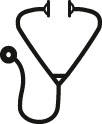Abstract

Background Richter syndrome (RS) is defined as the onset of an aggressive lymphoma, mostly diffuse large B cell lymphoma (DLBCL), in patients with chronic lymphocytic leukemia (CLL). The outcome of RS patients is usually very poor with both low response rates to chemoimmunotherapy and short survival. Modulating anti-tumor immunity has been suggested as a promising approach in RS (Ding, Blood 2017; Younes Lancet Hematol, 2019)). Blinatumomab is a bi-specific T-cell engaging antibody construct that transiently links CD3-positive T cells to CD19-positive B-cells, inducing T-cell activation and subsequent lysis of tumor cells. It has been been evaluated in patients with R/R DLBCL and demonstrated promising results (ORR 43%) with acceptable safety (Viardot, 2016).
We hypothesized that blinatumomab would improve response in RS patients failing to achieve CR after initial debulking with R-CHOP.
Methods We report here the final results of a phase 2 multicenter and prospective study investigating the efficacy and safety of blinatumomab after R-CHOP debulking therapy for patients with untreated RS of DLBCL histology (NCT03931642). The patients with persisting (PR, SD) or progressive disease (PD) after 2 cycles of R-CHOP were eligible to receive an 8-week course of blinatumomab induction. Blinatumomab was administered at a stepwise dose of 9 μg/d in the first week, 28 μg/d in the second week, and 112 μg/d thereafter. The primary endpoint was CR rate according to the revised Lugano criteria after the 8-week induction course of blinatumomab. An additional 4-week consolidation cycle was optional. Allo-HSCT was further allowed for eligible patients.
Results A total of 41 patients were enrolled in the trial and the final analysis set includes 39 patients who started on first cycle of R-CHOP. Median age was 66 years (range, 38-82) and sex ratio M/F was 26/13. CLL genetic features at baseline were as follows : 18/30 (60%) had 17p deletion, 20/31 (64%) TP53 mutations and 20/32 (63%) had complex karyotype. Median number of prior therapeutic lines for CLL was 2 (range, 0-7): 19 (54%) patients previously received chemo-immunotherapy, 23 (59%) patients were exposed to ibrutinib including 11 (28%) also exposed to venetoclax. Regarding RS features, 33 (90%) patients presented with advanced RS disease (Ann Arbor staging) and IPI was 0-1 for 2 (5%), 2-3 for 28 (72%) and 4-5 for 9 (23%) patients
As of the data cut-off of June 1st, 2022, the blinatumomab induction course has been completed for 25 patients. Fourteen patients did not receive blinatumomab for the following reasons: 9 patients achieved CR after R-CHOP, 1 patient progressed while on first cycle of R-CHOP, 3 patients died (2 because of febrile neutropenia and 1 following intracranial hemorrhage) after R-CHOP and 1 patient presented severe pneumonia after R-CHOP.
Regarding toxicity during blinatumomab induction, all patients had at least one grade 1 adverse event (AE), 9 had grade ≥3 AE. The most common all grade TEAE (> 1 case), regardless of relationship to blinatumomab, included fever (40%), CRS (16%), headache (16%), paresthesia (12%), cholestasis (12%), sepsis (8%), vein thrombosis (8%), dyspnea (8%), diarrhea (8%), constipation (8%). Grade >2 hematological toxicity was as follows : anemia (8%), neutropenia (4%) and thrombocytopenia (4%). In terms of neurologic events, 16 (64%) experienced neurotoxicity while grade >2 TEAE were seen only in 2 patients. All but one (confusion) recovered. Blinatumomab was temporarly stopped in 3 patients and permanently in 2.
In terms of efficacy, after completion of R-CHOP debulking therapy (n=34 evaluable patients), 9 patients achieved CR, 10 patients were in PR, 4 patients were stable and 11 patients were progressive. At evaluation after the blinatumomab induction (n=25 evaluable patients), 5 (20%) patients achieved CR, 4 (16%) patients PR, 6 (24%) patients were stable. Considering the whole strategy (including R-CHOP debulking) (n=39), 18 (46%) patients achieved overall response and 14 (36%) CR.
Conclusions The BLINART trial met its primary endpoint by showing that blinatumomab induces significant CR rate in patients with RS failing to achieve CR after R-CHOP debulking. Blinatumomab demonstrates encouraging anti-tumor activity and acceptable toxicity in patients with RS. Our study opens a new avenue for further immunotherapy strategies with bispecific antibodies in RS.
Disclosures
Guieze:Roche: Honoraria, Membership on an entity's Board of Directors or advisory committees; Amgen: Honoraria, Membership on an entity's Board of Directors or advisory committees; Astrazeneca: Honoraria, Membership on an entity's Board of Directors or advisory committees; Beigene: Honoraria, Membership on an entity's Board of Directors or advisory committees; Janssen: Honoraria, Membership on an entity's Board of Directors or advisory committees; Abbvie, Beigene, Janssen, Gilead, Roche, AstraZeneca: Honoraria, Membership on an entity's Board of Directors or advisory committees. Ysebaert:Abbvie, Astra-Zeneca, Janssen, Roche, Beigene, BMS/Celgene: Membership on an entity's Board of Directors or advisory committees, Research Funding. de Guibert:Janssen: Consultancy, Honoraria; Gilead: Consultancy, Honoraria; AbbVie: Consultancy, Honoraria. Laribi:AbbVie, AstraZeneca, Beigene, Iqone, Janssen, Novartis, Takeda: Honoraria. Broséus:Janssen: Honoraria, Research Funding; Novartis: Honoraria, Research Funding; Astra Zeneca: Consultancy, Honoraria; Gilead: Honoraria. Delmer:Takeda: Honoraria; Novartis: Honoraria; AstraZeneca: Honoraria, Membership on an entity's Board of Directors or advisory committees, Other: Travel Support; Abbvie: Honoraria; Janssen: Honoraria, Membership on an entity's Board of Directors or advisory committees, Other: Travel Support. Feugier:AstraZeneca, Janssen, Abbvie, Beigene, Gilead: Membership on an entity's Board of Directors or advisory committees, Other: Congress Invitations.
OffLabel Disclosure:
Blinatumomab is approved for acute lymphoblastic leukemia. The present work had evaluated this drug in Richter syndrome.
Author notes
 This icon denotes a clinically relevant abstract
This icon denotes a clinically relevant abstract
Asterisk with author names denotes non-ASH members.

This feature is available to Subscribers Only
Sign In or Create an Account Close Modal